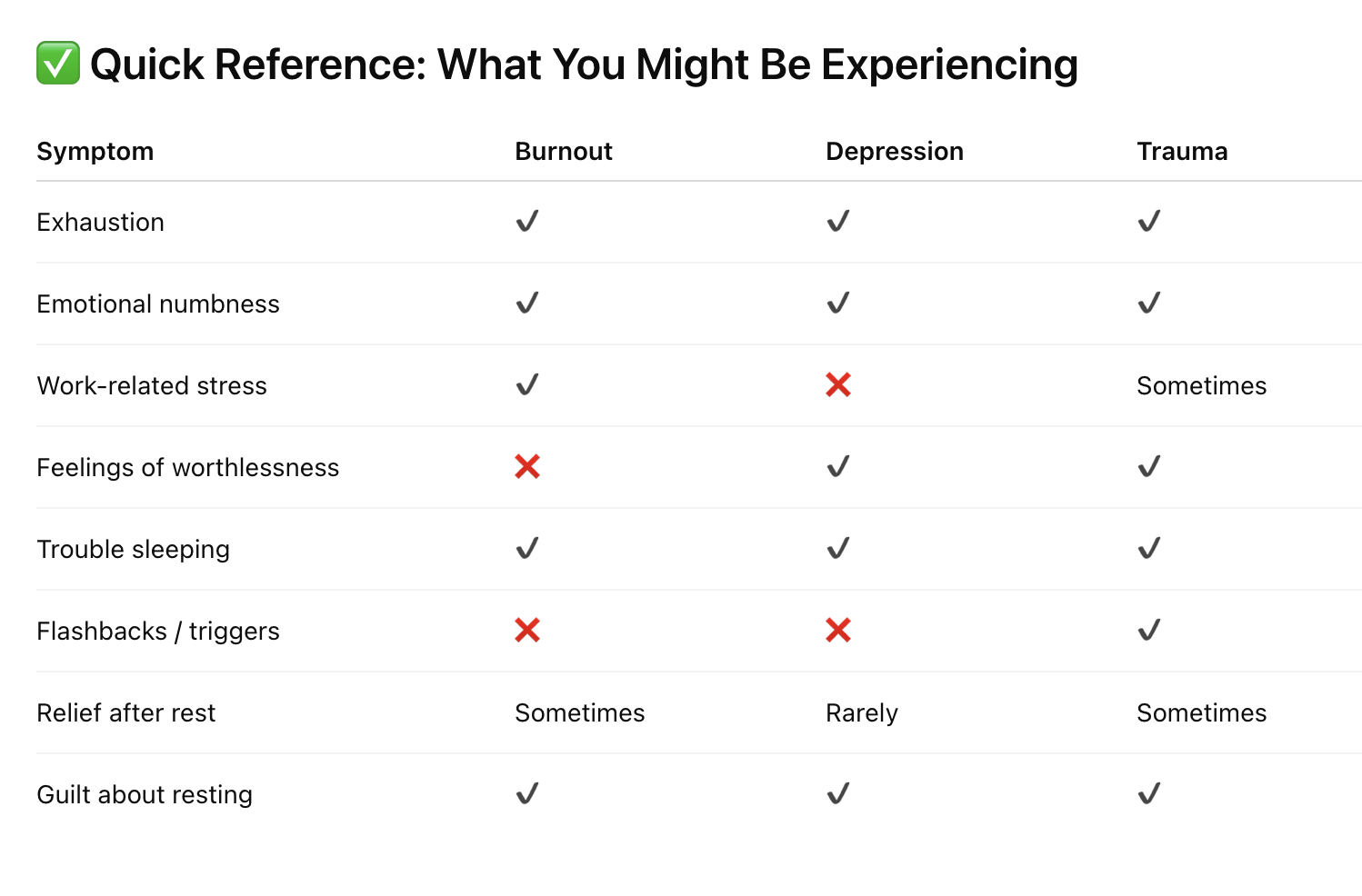What's The Difference Between Trauma, Depression, and Burnout?
If you’re exhausted all the time, struggling to focus, emotionally flat or overwhelmed, you might be wondering: Is this burnout? Is it depression? Or is it trauma I haven’t dealt with yet?
The answer might be one. It might be all three.
Let’s walk through the key differences between burnout, depression, and trauma and how to get the help that actually works.
What Is Burnout?
Burnout is a state of emotional, physical, and mental exhaustion caused by prolonged stress, especially in work or caregiving roles.
Common signs of burnout:
Feeling emotionally drained and mentally foggy
Detachment or cynicism about your job
Constant fatigue that doesn’t improve with rest
Trouble sleeping, frequent illness (See: Can Burnout Make You Sick?)
Feeling “numb” or like you're going through the motions
Burnout often affects people who are high-functioning and overextended: lawyers, executives, healthcare workers, teachers, parents, and perfectionists. It happens when your system has been running in survival mode for too long without a reset.
What Is Depression?
Depression is a clinical condition marked by persistent low mood and loss of interest or pleasure in activities you used to enjoy. Unlike burnout, it can show up in any context, not just work.
Common signs of depression:
Hopelessness, guilt, or self-blame
Loss of motivation or interest in things you care about
Anhedonia (the inability to feel joy)
Social withdrawal or isolation
Changes in appetite, sleep, and energy levels
Suicidal thoughts or feelings of worthlessness
Unlike burnout, depression doesn’t necessarily improve if your environment changes. It may need targeted therapeutic or medical support to shift.
What Is Trauma?
Trauma is a response to a distressing experience that overwhelms your ability to cope. This can include a single event (like a car accident or sexual assault), or long-term exposure (like childhood neglect, discrimination, or emotional abuse).
Common signs of unresolved trauma:
Hypervigilance or emotional shutdown
Flashbacks or intrusive thoughts
Difficulty regulating emotions or trusting others
Strong reactions to triggers that don’t make total sense
Patterns of overworking, people-pleasing, or avoidance
Trauma can look like burnout. It can look like depression. In many cases, it creates a foundation where both can grow unchecked.
How Burnout, Depression, and Trauma Interact
These experiences often overlap. For example:
Trauma survivors are more likely to burn out, because their nervous systems are already on high alert.
Someone in burnout for too long may develop depression, especially if they feel stuck or unsupported.
Depression can worsen both burnout and trauma symptoms by lowering motivation to seek change or support.
Burnout may be what brings you to therapy. But unprocessed trauma or underlying depression could be quietly keeping you stuck. This is why it’s important to work with a therapist who can help you untangle the root causes, not just treat the symptoms.
Common Questions About Burnout
“If I just take a break, will burnout go away?”
Maybe temporarily. But if the underlying patterns and beliefs (like work = worthiness, or never saying no) don’t change, burnout usually comes back. See: Why Your Vacation Won't Fix Anything
Burnout therapy helps you address the deeper mindset and nervous system responses that fuel chronic overwork.
“How do I know if I’m actually traumatized?”
You don’t need a capital-T trauma to benefit from trauma therapy. If you’ve had overwhelming experiences that still shape how you feel or react, especially around safety, control, or self-worth, you may benefit from trauma therapy.
“What kind of therapy helps with this?”
At Laurel Therapy Collective, we use an integrative, holistic approach that may include:
EMDR therapy: For reprocessing traumatic or overwhelming experiences, as well as unraveling dysfunctional beliefs.
Holistic therapy: Incorporating mind-body tools like nervous system regulation, somatic practices, and meaning-centered work
Therapy for burnout: To restructure your lifestyle, boundaries, and mindset so you can truly recover
No one-size-fits-all solution works. That’s why we tailor our approach to you.
What Treatment Works Best?
For burnout: Therapy that targets nervous system regulation, perfectionism, people-pleasing, and boundary setting. Often includes holistic therapy or lifestyle coaching.
For depression: A combination of therapy and sometimes medication. Therapy focuses on reducing shame, increasing motivation, and reconnecting with meaning.
For trauma: Trauma-informed therapy like EMDR, somatic therapy, or internal family systems (IFS). Treatment centers on safety, memory reprocessing, and integration.
The four layers of holistic healing should be applied to your recovery regardless of diagnosis.
Holistic Therapy For Burnout, Depression, and Trauma
If you’re asking whether you have burnout, depression, or trauma, you probably already know something isn’t working.
You don’t need to diagnose yourself to start healing. You don’t need to “prove” your pain is valid to get support. You just need to feel ready to stop surviving and start living again.
Ready to figure out what’s really going on?
At Laurel Therapy Collective, we offer therapy for burnout, trauma therapy, EMDR therapy, and holistic therapy for overwhelmed professionals in California and Florida. Whether you’re burned out, depressed, traumatized, or all of the above, we’ll help you untangle it and build a life that actually works.
Schedule a free consultation to find your way back to clarity, calm, and capacity.
















